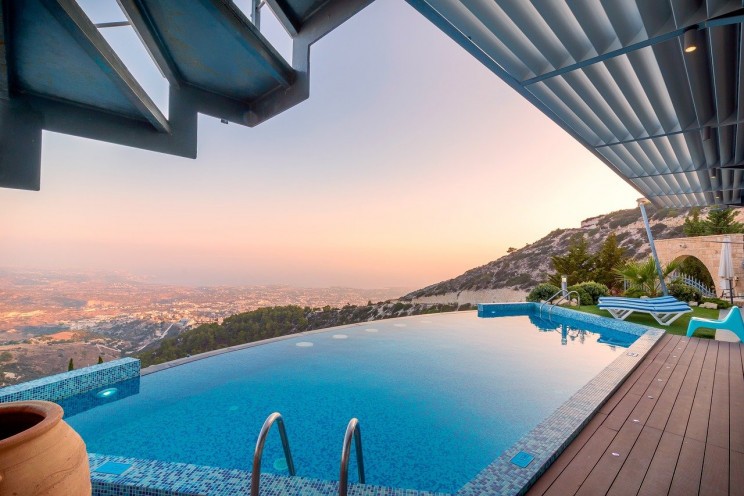
With the arrival of the hot summer weather, sitting by the pool and cooling off in the water sounds more and more appetising by the second. If you own a holiday home in Portugal or even live in Portugal permanently, then building a pool in your back garden may have crossed your mind. There are however some legal implications and rules to keep in mind. Do you need planning permission for a swimming pool in Portugal? Is a swimming pool license in Portugal mandatory? We explain everything, and in order to clarify all the questions, we have gathered all the important data to consider for the construction of a swimming pool in Portugal and whether or not it is necessary to have a license nowadays.
Does swimming pool construction in Portugal require a license?
Before starting to construct a pool at your Portuguese holiday home, it is recommended to know everything the Portuguese legislation says about private swimming pools. Based on Decree-Law No. 136/2014 of 9th Septembe, later amended by Rectification No. 46-A/2014 of 10/11, a license for the construction of swimming pools is no longer mandatory, however, a prior communication of the work is required.
"The realisation of urbanistic operations depends on a licence, prior communication with a deadline, hereinafter abbreviated as prior communication or communication, or authorisation of use, under the terms and with the exceptions set out in this section." (Article 4).
This means that there should be some sort of prior communication of the construction of the swimming pool to the local council in the area where your property is located. This obligation covers all types of pool construction systems, regardless of the project.
After the communication, the council is obliged to give an answer within 20 days. If there are no objections, you may therefore proceed with the pool construction project and this is all the planning permission necessary.

Licensing for the construction of swimming pools: what documents are necessary?
As mentioned, the construction of swimming pools in Portugal requires prior communication of the work to the local council and this may require the completion of a data form. The main documents required for the prior communication of the construction work are:
- Prior communication form, authenticated via digital signature;
- Legitimacy of the applicant and Property Registration: Citizen Card or Identity Card and NIF (Taxpayer Number)
- Plan of the location where the swimming pool will be built;
- Responsibility and authorship of the projects: to be signed by the authors of the project for compliance with the municipal development plans;
- Estimate of the total cost of the work;
- Schedule for carrying out the construction work;
- Photographic survey: set of current photographs for the construction, alteration, reconstruction or extension of buildings.
Since this is a rather bureaucratic issue, you can request all the information directly from your local council who will be able to guide you in this process.
Ask for help from pool construction companies in Portugal
Apart from the support you can request from your municipality, there are different pool construction companies in Portugal which also help in the whole process, from the previous communication of the work to the conclusion of the project. Because having a pool is something so appreciated Portugal, you will quickly find a construction company that is exclusively focused on building pools near your residence.

Does the construction of a pool in Portugal increase the IMI (property tax)?
When constructing your own pool in Portugal, something else to keep in mind is IMI - Municipal Property Tax - which increases with the construction of a pool.
Based on Article 43 of the IMI Code the construction of a pool in residential buildings will be affected by aggravation coefficients (from 0.06 for individual pools and 0.03 for private pools). Let's do the math:
Let us consider the IMI rate of 0.35% for a property of 150,000 euros. In this case, we have to multiply the IMI rate of 0.35% by 150,000 Euros, which is the Tributary Patrimonial Value (VPT) and which results in 525 euros/year of property tax. With the construction of a swimming pool, IMI increases because:
The Tributary Patrimonial Value (VPT) goes from 150 to 159 thousand euros (multiplying 150,000 euros x 1,06 of the coefficient). Then you multiply 0.35% (IMI rate) x 159 thousand euros (VPT with swimming pool) = 556.5 euros/year (IMI). Therefore, instead of 525 euros/year, you will pay 556,5 euros/year when it comes to IMI.
In practical terms, the calculations of the increase in IMI for those who have a pool are not very complicated. Any questions you may have can be dealt with through your accountant or by consulting the Portuguese Tax Authority (Finanças).
Aspects to consider before building a swimming pool in Portugal

As mentioned, it is not necessary to have a licence for the construction of swimming pools. Even so, you cannot forget a number of elements if you are interested in having this leisure space at your holiday home in Portugal.
- Type of land: understand if the land in your garden is suitable for the construction of a swimming pool and if it is necessary or not to do some garden cleaning. You should also understand if the place where the pool will be built receives sunlight and if it guarantees certain privacy;
- Pool dimensions: the ideal size of a pool depends a lot on what you want to do with it. The larger a pool, the more expensive the project and maintenance will be, but it may be worth it if you have a large family or if you love to entertain your friends at home;
- Type of pool: there are many different options when it comes to building a pool. There are those who prefer conventional pools, while the more daring ones appreciate a sand pool, which can take them closer to the ocean, or an infinity pool for a touch of luxury;
- Pool maintenance: specific products and materials are needed to care for and clean a pool and can be found in some decoration and hardware shops such as IKEA, Leroy Merlin or Maxmat;
- Safety: even for private pools, safety needs to be taken into account. Aspects such as access, depth, signage, corner design, protective covers, types of tiles, etc. should not be forgotten to ensure the best experience for everyone, from kids to adults.